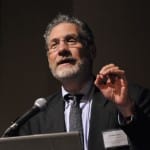Top Story
Thursday, March 21, 2013 — 1:30 p.m.–2:45 p.m.
Greening Affordable Housing
Green building has moved from being just about design, operations, and certification to creating and maintaining sustainable housing and communities. This session will explore the latest trends in greening housing that is affordable. By sharing examples of housing developments from across the country, panelists will discuss topics such as reducing utility consumption and cost through sustainable building practices. The session will also explore holistic design and planning that incorporates environmental health through tools such as health impact assessments.
Additional Session Resources
Speaker Biographies and Presentations
 Trisha Miller, HUD’s Office of Sustainable Housing and Communities (moderator)
Trisha Miller, HUD’s Office of Sustainable Housing and Communities (moderator)
Trisha Miller serves as a senior adviser at the U.S. Department of Housing and Urban Development (HUD) in the Office of Sustainable Housing and Communities, where she works to advance energy and green building policy. Previously, she managed the Green Communities initiative at Enterprise Community Partners. Her work focused on leveraging private and public investment in green affordable housing development and sustainable building practices across the country. Miller led all aspects of the initiative, including maintaining the Green Communities Criteria and deploying more than $4 million in grants and technical assistance. She created a national technical assistance network and supported the development of 20,000 units of green housing. Miller has testified before the U.S. Senate Banking Committee and frequently delivers keynote addresses and lectures on green housing. Before joining Enterprise, she directed the Lawyers’ Committee for Civil Rights’ Community Development Initiative. As a Skadden fellow, Miller launched this innovative project to bring legal resources to nonprofit housing and economic development organizations and thousands of individuals across the southern United States.
Miller graduated magna cum laude from the University of Michigan, with a degree in environmental policy. She received her master’s degree in city planning from the Massachusetts Institute of Technology and her law degree from Stanford Law School.
 Erin Christensen, Mithun
Erin Christensen, Mithun
An urban designer and architect, Erin Christensen has experience in urban redevelopment and neighborhood planning across the country that enables communities large and small to achieve lasting vitality and strength. As a national leader in integrating public health and design, including pioneering health impact assessments of neighborhood planning projects, Christensen brings innovative thinking to master-planning and redevelopment strategies for local governments, neighborhoods, public housing authorities, transit agencies, and private developers. She is passionate about creating sustainable, high-performance development that builds physical and social community and maximizes investment. Christensen is an expert in eco-district planning and integrating a variety of environmental metrics to help guide stakeholders through a proactive decision-making process.
Christensen’s early career focused on housing, and she spent nearly eight years responsible for a broad range of mixed-use, mixed-finance projects for private and public sector clients in Washington, D.C.; the neighborhoods of Boston; at Horizon Village HOPE VI in North Charleston, South Carolina; and nationally. Her recent work includes integrating community health indicators into the Denver Housing Authority’s Mariposa/South Lincoln Redevelopment plan with use of the Healthy Development Measurement Tool (HDMT) as part of the overall master-planning process. She lectures nationally on the relationships between health and design and is participating in this year’s class of the ULI Northwest Center for Sustainable Leadership program.
 jv DeSousa, WORKSHOP8 architecture | planning | design
jv DeSousa, WORKSHOP8 architecture | planning | design
jv DeSousa is a founding partner of and an architect at the firm WORKSHOP8 architecture | planning | design in Boulder, Colorado. WORKSHOP8 is a multidisciplinary architecture, planning, and design studio creating exciting solutions that inspire, enrich, and transform lives. The firm seeks meaningful, compelling projects that present the opportunity to improve the built environment in ways that reduce people’s impact on the natural environment; harmonize patterns of habitation with natural systems; create shared bonds of community; foster appreciation for diversity, complexity, and inclusion; and have a lasting effect on the world of the future.
With 24 years of experience in the architecture field, DeSousa takes a critical approach to design, striving to create environments that transcend the exigencies of program and budget to become memorable, evocative, and timeless. He has written numerous articles and has lectured widely. His buildings and landscapes have won awards from the American Institute of Architects and the American Society of Landscape Architects and his work has been published in national design magazines.
DeSousa was the principal in charge for Paisano Green Community, a 73-unit, LEED Platinum, net-zero, affordable housing facility for seniors for the housing authority of the city of El Paso, Texas. His experience spans many building types, including single- and multifamily residential; research laboratories and hospitals; entertainment/hospitality; commercial; and institutional design.
DeSousa received a bachelor of science degree from Cornell University and a master of architecture degree from the University of Texas at Austin.
 Jonathan F.P. Rose, Jonathan Rose Companies LLC
Jonathan F.P. Rose, Jonathan Rose Companies LLC
Jonathan F.P. Rose’s business, public policy, and not-for-profit work all focus on creating a more environmentally, socially, and economically responsible world. In 1989, Rose founded Jonathan Rose Companies LLC, a multidisciplinary real estate development, planning, consulting, and investment firm, as a leading green urban solutions provider. The firm has completed $1.5 billion of work. In 2005, the firm launched the nation’s first green transit-oriented acquisition and redevelopment fund.
With a mission to repair the fabric of communities, the firm draws on its human capital, financial depth, and real estate expertise to create highly integrated solutions to real estate challenges. The firm’s work touches many aspects of community health, working with cities and not-for-profit organizations to build not only housing, but also civic, cultural, educational, and infrastructure facilities.
A thought leader in the smart growth, national infrastructure, green building, and affordable housing movements, Rose is a frequent speaker and writer. His work has received widespread media attention from CNN to the New York Times and was profiled in e², a PBS series on sustainable development. The firm’s innovative development, planning, investment, new construction, conversion, and historic preservation work has won awards from a wide range of notable organizations including the National Trust for Historic Preservation, the Natural Resources Defense Council, Global Green USA, the Urban Land Institute, the American Planning Association, and the American Institute of Architects.
Rose is vice chair of Enterprise Community Partners and is a trustee of the Natural Resources Defense Council. He also serves on the board of the Brooklyn Academy of Music, and is an honorary member of the American Institute of Architects. Rose chaired the Metropolitan Transit Authority’s Blue Ribbon Sustainability Commission, which developed the nation’s first green transit plan, and was a commissioner on Governor Andrew Cuomo’s NYS 2100 Commission, tasked with identifying strategies for the long-term resilience of New York State’s infrastructure post−Hurricane Sandy. He is also a cofounder of the Garrison Institute with his wife, Diana Rose, where he leads the Climate, Mind, and Behavior Program.
Rose graduated from Yale University in 1974 with a BA in psychology and philosophy, and received a master’s degree in regional planning from the University of Pennsylvania in 1980.